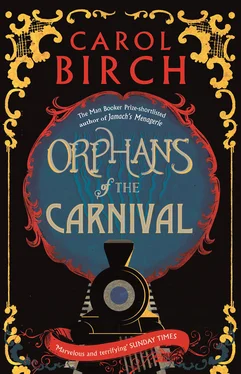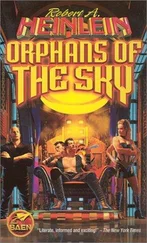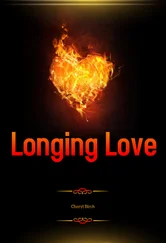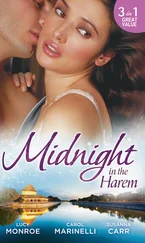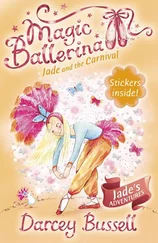They sailed from New York on a mail ship to Liverpool. She walked covered through the raucous crowds of sailors and nervy passengers in knots and scatters, seeing little of the teeming wharf but aware of incessant noise and a hectic press of bodies. Theo held her tightly by the hand, keeping her close to him as if she was a child, up the gangway and onto the great ship. It was top-notch, he said, the only way to cross. ‘Look at that, the size of those wheels! Safe as houses. And I got you the best, Julia. The best I could.’
Her cabin was small but comfortable. For most of the eleven-day voyage she stayed in it, taking her meals in there alone. It was just easier. ‘All that gawking,’ Theo said. ‘Don’t you get sick of it all? Gawk gawk gawk.’ It was hard to be on board ship, to hear the waves and smell the sea and not have freedom of the decks.
He’d knock on the door. ‘Julia,’ he’d say, ‘I brought you some wine.’
‘Oh, thank you, Theo,’ she’d say, and with a wink he’d set it down on the tiny table in her tiny cabin, and off he’d go. Other times, he’d cram himself in, sit down with his hands behind his head and laugh, tell her about the lovely dining room and make fun of the other passengers to keep her amused. When the sun was beginning to fade, he’d come for her, and she’d put on her veil and gloves, and they’d go for a walk about the deck. If the sea was calm it was heavenly, a lovely time of day. The moon would come up and make the water oily black, and the stars would remind her of home. There was fog off the Grand Banks, and a few rough days towards the end, but mostly the weather was fine. She enjoyed the rough times, in any case. She never got sick. Theo did. One particularly bad day when the sea threw up walls of water and heaved them creaking in and out of great troughs and valleys, she went up on deck and walked about holding onto things. It was wonderful. They’d told the passengers to stay below and everyone was hunkered down calling for sick bowls, but she went up in her veil, folding it back from her face when she saw the emptiness of the deck, letting the wind whip tears backwards from her eyes. The weather scoured her face. She was an ant on a bobbing cork. If she let go, the sky would whip her away like a bit of old paper. She walked about for ten minutes before dropping the veil once more and going down to see how Theo was.
‘Do you need more water?’ she asked, putting her head round the door.
Theo was lying on his side with a white face and his hair greasing up the pillow.
‘No thank you,’ he said weakly. He’d not been sick for the past two hours but the faint smell of vomit lingered.
‘They’re saying it’ll be better tomorrow,’ she said.
‘Uh.’ His closed eyelids flickered.
‘That pillow needs turning,’ she said. ‘Move your head.’
‘It’s all right.’
‘No, move your head.’
‘Julia,’ he said, ‘I’m trying not to move my head.’
‘Won’t take a second. Here. Let’s slip this under, there. Better?’
Just like the old days, nursing Solana. He turned onto his back and frowned, swallowing loudly, his throat convulsing, opened his eyes and looked at her, focusing slowly like a child waking up. She had an urge to stroke his high white forehead, could have done so easily, just wiping the sweat away, but she fought it down.
‘I’ve been up on deck,’ she said quickly.
‘In this? Are you mad?’
‘It’s lovely. There’s no one up there. I can walk about without my veil.’
‘Do be careful, Julia.’
‘Oh, don’t worry. You don’t need to tell me.’
‘Sit down for a minute,’ he said. ‘I’m bored stiff.’
‘Someone recognised me by my boots once,’ she said, sitting down on the end of the bed.
‘There you are.’ He swiped sweat from his forehead. ‘You can’t be too careful.’
‘It was horrible.’ She looked away, suddenly awkward to be this close with him, all sick and tousled as he was in his pyjamas.
‘What happened?’ he asked.
‘They threw stones at me. Children.’
He waited a moment, and it seemed to her that the air between them charged like a battery. ‘Go on,’ he said.
‘Beach came and chased them all away.’ She looked at him and smiled, dispelling the charge. ‘Have you ever been really scared?’
He thought.
‘I mean really scared like you were going to die or something was going to hurt very badly?’
He thought some more then said, ‘I don’t think I have. Not like that.’
‘I was scared then. One boy had a knife and he kept coming really close with it. And I got this scar. From a stone. Look.’ She leaned a little forward and parted some of the hair on her cheek.
‘My God, I never noticed that,’ he said.
‘Oh, you wouldn’t. It’s a small thing, but at the time…’
‘Children are cruel,’ he said. ‘Here’s what you do.’ He raised himself up a little and put his hands behind his head. ‘You step outside yourself. Don’t react.’ He put on his half smile of non-concern. ‘They don’t exist.’
‘A stone exists when it hits you in the face,’ she said.
‘Well, you could probably debate that with a philosopher.’
‘Don’t think I’ll bother.’
He smiled.
‘Why?’ she asked. ‘When have you had to do that?’
‘Do what, chick?’
She softened at the ease of his tone.
‘Pretend you didn’t care.’
‘Oh.’ He sniggered. ‘Everyone has to do it sometimes.’
‘Hm!’ she said, looking away, slightly annoyed, he thought, for some reason. So he went on talking. ‘You know, you don’t own the monopoly, Julia. I had to stay at my uncle’s up in Westchester County. My cousins were pigs.’
‘What did they do?’ She looked back, interested.
‘What they… it wasn’t so much what they did as…’
He was beginning to look bilious again.
‘Are you all right?’
‘Yes,’ he said, ‘but I think I’ll sleep some more.’
She left him to rest, closing the door quietly and going back to her cabin, where she lay down on her own bunk and thought about him for a long time, feeling sorry for the poor boy in Westchester County with his horrible cousins, and wondering what it was they’d done to him.
She tried to go on deck again next day but too many of the crew were about, and then it was too late because the sea calmed down, the screaming wind died away to a mumble, and the weather turned to a grey drizzle that accompanied them all the way to Liverpool, where they disembarked in a solid downpour.
The docks went on forever, huge piers and basins, massive buildings lining the river. The sky above them was bunched and black, and rain put a gleam and a polish on the stones of the quay. They got a bus straight to the station, through rough old streets, narrow and crowded. Packs of hungry-looking boys roamed and the cobbles shone. At the station the waiting rooms were full. On the platforms the people pushed so close to the edge with their suitcases and trunks it was a wonder they didn’t spill over onto the line. They waited two hours for the London train. Babies screamed, one striking up as another subsided. She thought she’d die of weariness. Theo made her a place to sit, next to a wall and shielded from view by a tower of trunks, but she became hot and started sweating under the veil. Her hands itched and she longed to take off her gloves and give them a good scratch.
‘Don’t worry,’ he said, ‘you can have a sleep on the train.’
They were travelling first class; they’d be in London by nightfall.
‘So soon?’ she said.
‘This is a small country, Julia.’ He sat down on an upturned suitcase and smiled. ‘You’ll get used to it.’
Читать дальше
